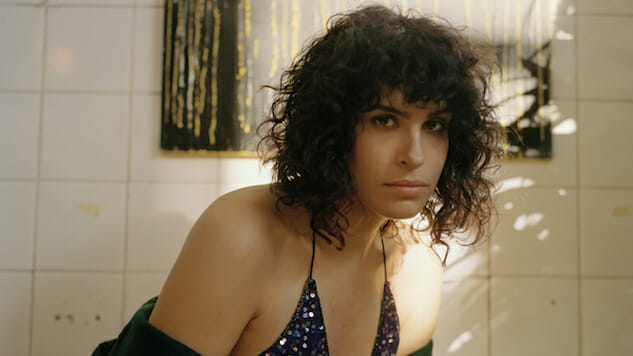Does Desiree Akhavan’s The Bisexual Skewer Stereotypes, or Succumb to Them?
Photo: Tereza Cervenova/Hulu
Late last month, in one of its sharpest episodes this season, The Good Place not only outed protagonist Eleanor (Kristen Bell) as gleefully down to smooch any and all hotties, whenever and wherever they might be found, but it also used Eleanor’s laissez-faire attitude and laser-focused hedonism to establish a pretty simple philosophy about sexuality in general: “Why not?” she all but shouts at Chidi (William Jackson Harper) after he breaks it to her that no, he’s not bi. “More guys should be bi. It’s 2018! It’s like, get over yourselves!”
It’s 2018: get over yourselves. This is the kind of relatable content the socially progressive, GIF-making corner of the Internet is hungry for. We already had bi teen activist queen Emma Gonzales, and bi children’s cartoon queen Avatar Korra, and all-around YouTube queen Anna Akana coming out as bi while on stage at the Streamys for her own YouTube series—which featured bi and gender fluid characters—after an arc playing girlfriend to bi scientist queen Camille (Allison Scagliotti) on Freeform’s (now cancelled) Stitchers. Now we get to add Eleanor Shellstrop, self-professed Arizona Trashbag and queen of the relatable reaction GIF, to the list? Oh, and late-breaking news, newly elected (not trashbag) Arizona Senator Kyrsten Sinema is now the first out bisexual woman to be elected to Congress. Yes, please. That sound you hear? That’s the sound of decades of bi stigma in the media starting to crumble.
British television, it seems, has not gotten the message. This, at least, is the only conclusion I can draw after watching Desiree Akhavan’s six-episode cringe dramedy, The Bisexual, which creates a comedic frame around bisexuality that is either regressively stuck in last decade’s discourse, or else is so deadly deadpan that I’m too American to get it just how skewering it is.
“When I hear ‘bisexual’ I think ‘lame slut,’” Akhavan’s self-repressing, sexually voracious bisexual protagonist, Leila, explains in one of part of the trailer to her new roommate, Gabe (Brian Gleeson), with the kind of heightened staccato articulation that is the character’s uncomfortable signature. “It’s tacky. It’s gauche. It makes you seem disingenuous, like your genitals have no allegiance.”
This is a joke, obviously. Or at least, I think it’s a joke? It’s probably a joke. But as with the rest of the series—not just Leila’s hot-mess-who-can’t-commit storyline, but Gabe’s stunted man-growth one, the baby fever one of Leila’s older ex (Maxine Peake), and all those significantly less fraught ones belonging to the various women on the Gen-Z/Millennial cusp that drift around the older characters like less anxious, more emotionally mature satellites—I can’t really tell which angle of it I am meant to be laughing at, and which is meant to be the show delivering on its promise, per the press materials, to “examine the funny, painful complexities of realizing that the one you love, and the life you need, may be two very different things.”
Is Leila’s unnaturally articulated delivery meant to signal that this regressive, self-hating attitude about bisexuality is the butt of the joke? Or is it Gabe’s blinkered, privileged-white-man backwardness in bringing the term up as one she should be using at all that we are meant, with Leila’s sharp, sure rejoinder as our guide, to be pointing and laughing at?
-

-

-

-

-

-

-

-

-

-

-

-

-

-

-

-

-

-

-

-

-

-

-

-

-

-

-

-

-

-

-

-

-

-

-

-

-

-

-

-








































